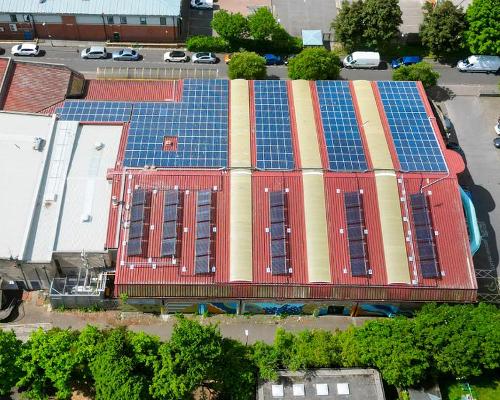05 Aug 2022
Solar technology reduces swimming pool heating costs to zero in energy-saving pilot scheme
BY Frances Marcellin

Easton Leisure Centre in the UK has announced a 100 per cent reduction in heating costs of its 25m swimming pool this summer.
Leading a pilot project set up by Bristol City Council and Everyone Active, 800 solar thermal tubes were installed on the roof in May, costing £89,000, which has cut its energy costs entirely during the longer daylight hours.
The council says a typical leisure centre produces approximately 500 tonnes of carbon dioxide each year and that the new system will save almost 13 tonnes of CO2 from entering the atmosphere over a twelve-month period.
With spiralling energy prices, combined with the urgent need to reduce fossil fuel consumption, Bristol City Council has spearheaded this campaign so its swimming pools can stay open to the public, with plans to roll out to other sites.
By integrating solar technology, leisure centres can benefit from energy cost savings of up to 60 per cent for heating water and up to 35 per cent for heating spaces. The tubes absorb the sun’s energy which is then transferred by thermal collectors into the site’s existing hot water storage. Easton’s system previously ran on gas, now that can be turned off when there is ample energy generated by the new technology.
“We haven’t used gas to heat the main pool water since the system was installed,” says GM Noel Hickman. “Later in the year, with reduced daylight, we anticipate using gas again at some point, but it will be reduced by the contribution of the heat still coming from the roof.”
The solar thermal tubes were installed by Solarsense. Founder and MD Stephen Barrett says that while the technology has been used for smaller-scale facilities, it’s been underused so far in the UK for bigger operations such as leisure centres.
“It has the ability to make an ongoing and very powerful difference, cutting energy bills in even the darkest winter months when the solar supply can be topped up with gas,” he says. “It also has the potential to pay for itself multiple times over the course of its life.
"With gas prices at record levels, the length of the payback period is shorter than previously and once the initial outlay has been covered, savings will continue for the lifetime of the system, which is estimated to be around twenty years.”
Easton Leisure Centre has calculated that for every hour the solar technology is working, it saves 6p per kwh, which is on track against estimates. The size of the main pool is 25m x 13m, with a surface area of 325sq m, and a pool water capacity of 487.5 cubic metres.
Solarsense used T*Sol software to calculate the amount of gas projected to be saved and the heat that will be generated over the course of a year, using data from the nearest weather station.
The T*Sol report automatically calculates CO2 savings from reduced gas use.
“It’s exciting to see such a vital and visible part of the community as Easton Leisure Centre taking action to reduce its emissions and supporting Bristol’s climate ambitions,” said councillor Kye Dudd, cabinet member for climate, ecology, waste and energy at Bristol City Council. “Everyone Active is now working closely with Bristol City Council to find more innovative solutions to reduce its carbon footprint.”
Recent findings from a UK Active survey of almost one-third of public sector facilities showed that energy costs would increase by 150 per cent for 2022 compared with 2021, and 185 per cent in 2023. They also showed that 79 per cent of facilities would be “likely or extremely likely” to be forced to stop operating completely in the next few months, with that figure increasing to 85 per cent in the next 12 months.
A new coalition – comprising UK Active, Swim England, the Local Government Association, the Chief Cultural and Leisure Officers Association (CLOA), CIMSPA, the District Councils’ Network (DCN) and Community Leisure UK (CLUK) – recently submitted a letter to the UK government requesting financial support amidst the growing energy crisis.
Huw Edwards, CEO of UK Active, said: “Many of our members have told us that rising energy bills have put them at real risk of closure. We need the government to act, or these essential facilities will start to disappear from our communities.”
Close Window